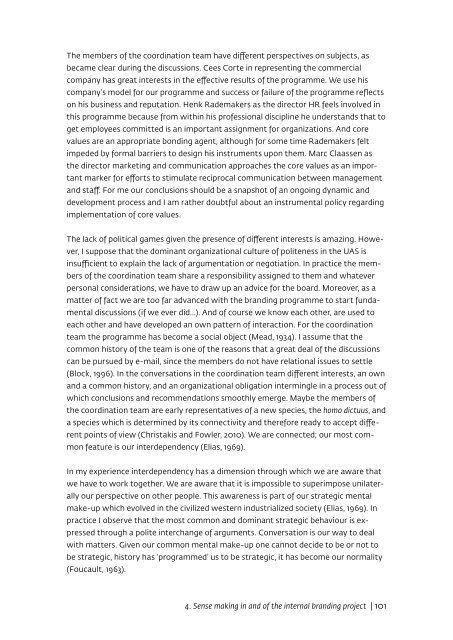Rumbling on performativity_Frits Simon
Rumbling on performativity_Frits Simon
Rumbling on performativity_Frits Simon
Create successful ePaper yourself
Turn your PDF publications into a flip-book with our unique Google optimized e-Paper software.
The members of the coordinati<strong>on</strong> team have different perspectives <strong>on</strong> subjects, as<br />
became clear during the discussi<strong>on</strong>s. Cees Corte in representing the commercial<br />
company has great interests in the effective results of the programme. We use his<br />
company’s model for our programme and success or failure of the programme reflects<br />
<strong>on</strong> his business and reputati<strong>on</strong>. Henk Rademakers as the director HR feels involved in<br />
this programme because from within his professi<strong>on</strong>al discipline he understands that to<br />
get employees committed is an important assignment for organizati<strong>on</strong>s. And core<br />
values are an appropriate b<strong>on</strong>ding agent, although for some time Rademakers felt<br />
impeded by formal barriers to design his instruments up<strong>on</strong> them. Marc Claassen as<br />
the director marketing and communicati<strong>on</strong> approaches the core values as an important<br />
marker for efforts to stimulate reciprocal communicati<strong>on</strong> between management<br />
and staff. For me our c<strong>on</strong>clusi<strong>on</strong>s should be a snapshot of an <strong>on</strong>going dynamic and<br />
development process and I am rather doubtful about an instrumental policy regarding<br />
implementati<strong>on</strong> of core values.<br />
The lack of political games given the presence of different interests is amazing. However,<br />
I suppose that the dominant organizati<strong>on</strong>al culture of politeness in the UAS is<br />
insufficient to explain the lack of argumentati<strong>on</strong> or negotiati<strong>on</strong>. In practice the members<br />
of the coordinati<strong>on</strong> team share a resp<strong>on</strong>sibility assigned to them and whatever<br />
pers<strong>on</strong>al c<strong>on</strong>siderati<strong>on</strong>s, we have to draw up an advice for the board. Moreover, as a<br />
matter of fact we are too far advanced with the branding programme to start fundamental<br />
discussi<strong>on</strong>s (if we ever did...). And of course we know each other, are used to<br />
each other and have developed an own pattern of interacti<strong>on</strong>. For the coordinati<strong>on</strong><br />
team the programme has become a social object (Mead, 1934). I assume that the<br />
comm<strong>on</strong> history of the team is <strong>on</strong>e of the reas<strong>on</strong>s that a great deal of the discussi<strong>on</strong>s<br />
can be pursued by e-mail, since the members do not have relati<strong>on</strong>al issues to settle<br />
(Block, 1996). In the c<strong>on</strong>versati<strong>on</strong>s in the coordinati<strong>on</strong> team different interests, an own<br />
and a comm<strong>on</strong> history, and an organizati<strong>on</strong>al obligati<strong>on</strong> intermingle in a process out of<br />
which c<strong>on</strong>clusi<strong>on</strong>s and recommendati<strong>on</strong>s smoothly emerge. Maybe the members of<br />
the coordinati<strong>on</strong> team are early representatives of a new species, the homo dictuus, and<br />
a species which is determined by its c<strong>on</strong>nectivity and therefore ready to accept different<br />
points of view (Christakis and Fowler, 2010). We are c<strong>on</strong>nected; our most comm<strong>on</strong><br />
feature is our interdependency (Elias, 1969).<br />
In my experience interdependency has a dimensi<strong>on</strong> through which we are aware that<br />
we have to work together. We are aware that it is impossible to superimpose unilaterally<br />
our perspective <strong>on</strong> other people. This awareness is part of our strategic mental<br />
make-up which evolved in the civilized western industrialized society (Elias, 1969). In<br />
practice I observe that the most comm<strong>on</strong> and dominant strategic behaviour is expressed<br />
through a polite interchange of arguments. C<strong>on</strong>versati<strong>on</strong> is our way to deal<br />
with matters. Given our comm<strong>on</strong> mental make-up <strong>on</strong>e cannot decide to be or not to<br />
be strategic, history has ‘programmed’ us to be strategic, it has become our normality<br />
(Foucault, 1963).<br />
4. Sense making in and of the internal branding project | 101



